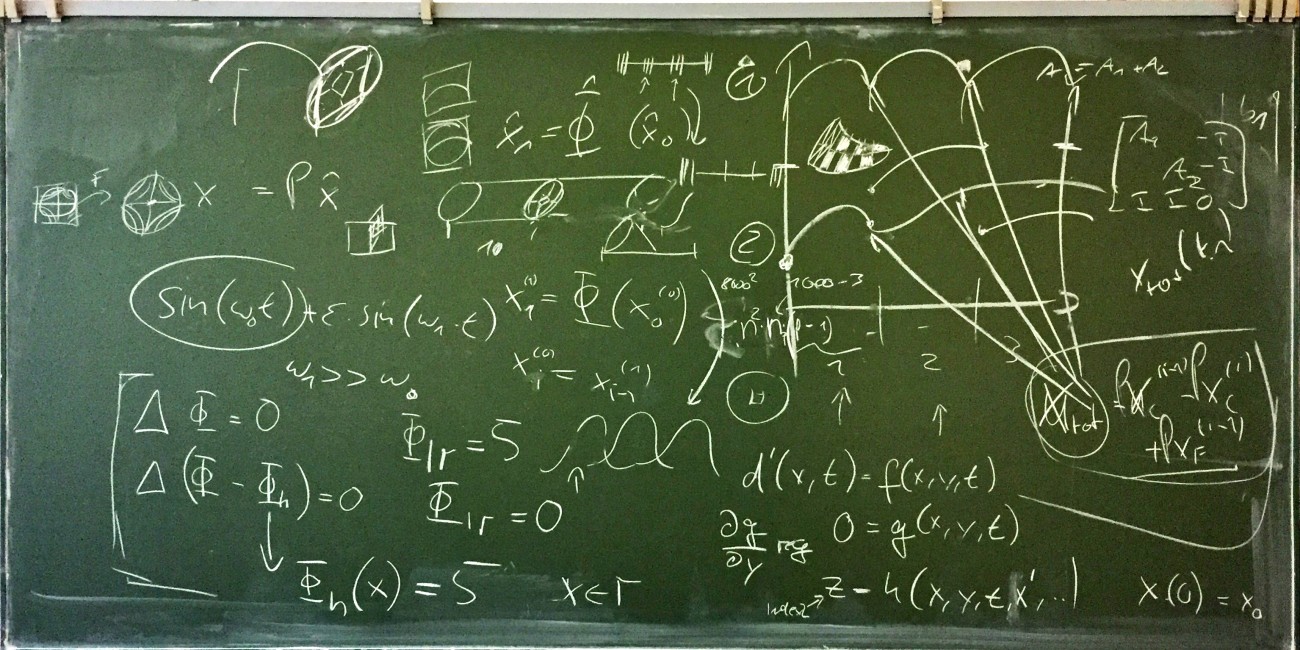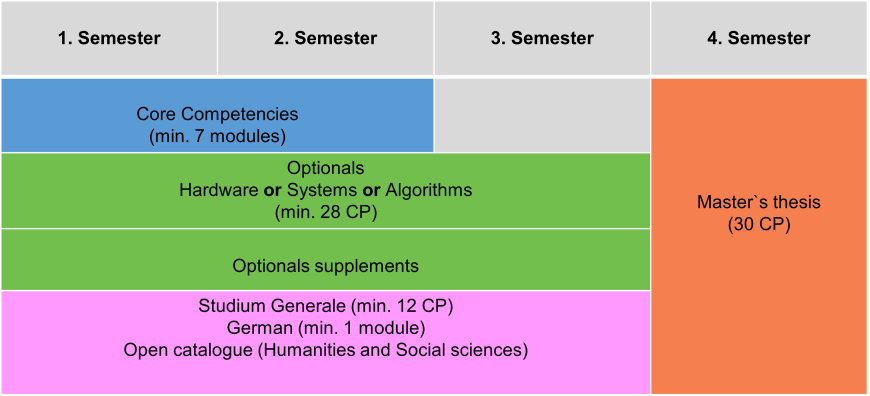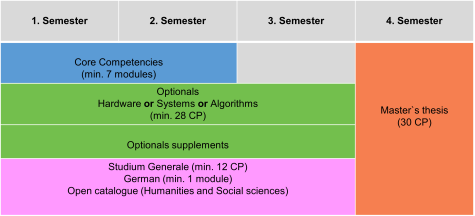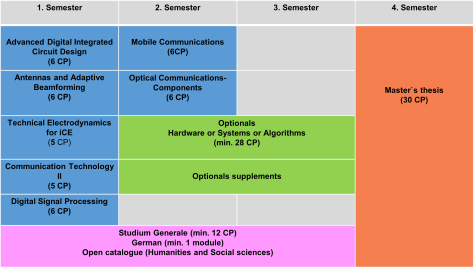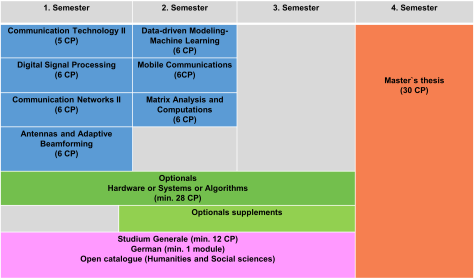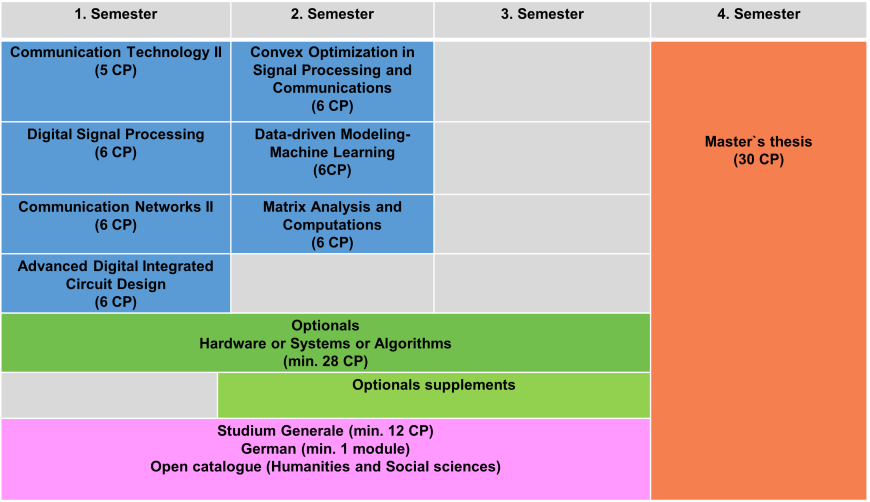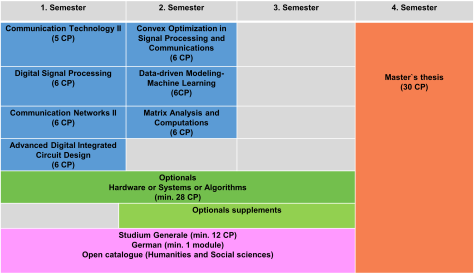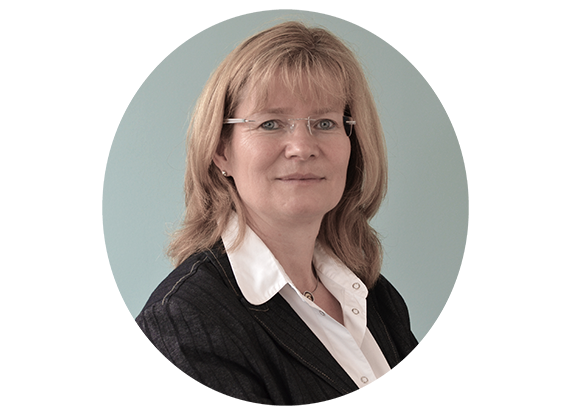- 4 semester study program, corresponding to 2 years
- 6-month master's thesis
- specialisation to Hardware, Systems or Algorithms
- Research and application-oriented projects
- Wide range of electives
- General Studies like Management, Softskills, Professional panel and German language
TU Darmstadt graduate courses are high quality and facilitating your swift career progression. Our approach to graduate study places an emphasis on your ability to work independently, while supported by an outstanding academic community.
The full catalogue of the department can be found in TUCaN.
Core Competencies:
Professor: Prof. Dr.-Ing. Klaus Hofmann
Learning goals:
A student is, after successful completion of this module, able to 1. understand the short-channel effects of modern CMOS transistors, 2. derive and analyse the most important circuit concepts for digital logic gates, 3. understand the design flow of digital ASICs based on standard cells (design, layout, simulation/verification), 4. knows the pros and cons of synchronous vs. asynchronous logic, multiclockphase systems, 5. understands the differential design methods of integrated circuits (ASIC, ASIP, Full-custom/Semicustom, PLA, PLD, FPGA), 6. understands basic circuitry of logic and arithmetic units (adders, multipliers, PLL/DLL), 7. knows the design principles and properties of integrated semiconductor memory (DRAM, SRAM, Flash. MRAM, FeRAM)
Contents:
MOS Transistor Models
CMOS Logic Gates
Chip Layout and Design Rules
Static and Dynamic Behavior of CMOS Circuits
Synchronous CMOS Circuits
Performance and Power Characterisation
Design Techniques and CAD Tools
FPGA and Gate Array Technologies
Memory Technologies
Chip Test
Teaching material: script, slides, comments
Professor: Prof. Dr. Rolf Jakoby
Learning goals:
Students will know basic antenna parameters: pattern, gain, directivity, half-power beamwidth, side- lobe-level, efficiency and input impedance to compare, assess and evaluate different antennas for various applications and operating frequencies. The antenna field regions, reactive near-field, near-field and far-field, can be differentiated and the far-field pattern of an antenna can be determined from given current distributions along the antenna by using Fourier transformation or integral solutions with distributed ideal dipoles as basic elements (antenna analysis). To assess in general physical requirements, constrains and limitations of antennas, students can use fundamental antenna theory: impedance matching techniques, antenna modeling and far-field pattern analysis, antenna synthesis, image theory and fundamental limits of electrically small antennas. After being incorporated into the different adaptive beamforming techniques, the array theory enables the student to design antenna systems that are assembled of a certain number of separate elements, feeding network, beamforming network etc. for phased-scanning or smart antennas in communications and sensing. Moreover, students are able to determine, analyze and evaluate the most important classes of antennas in wireless technology for many applications, operating frequencies, desired requirements or practical constrains: (1.) wire- dipole antennas,(2.) planar antennas (microstrip, dipole and slot antennas), (3.) aperture antennas (horn antennas, parabolic reflector antennas, lens antennas, Cassegrain and Gregorian double-reflector configurations), (4.) broadband and frequency-independent antennas (V antennas, biconical antennas, helical antennas, spiral and log-periodic antennas).
Contents:
Overview of most important antenna parameters types as well as their applications. Fundamental theories:Fourier transform for far-field pattern calculations, antenna modeling techniques, antenna synthesis methods, image theory, determination of field regions of line sources, of the average radiated power density and power,directivity and gain. Antennas as key elements in power budgets of radio links, introducing the effective aperture of an antenna, deriving the relation between gain and effective aperture. Array antennas are a key hardware for beamforming and smart antenna systems: fundamentals of phased-scanning arrays, non-uniformly excited, equally spaced linear arrays, multi-dimensional planar arrays and mutual coupling effects. Wire antennas: still the most prevalent of all antenna forms, relatively simple in concept, easy to construct, very inexpensive. Antenna radiation fields and antenna parameters for different types of antennas are derived from Maxwell´s equations, applied for aperture antennas (horns, lenses or reflector antennas) and printed antennas (microstrip-patch and coplanar-slot antennas) Some basic numerical calculation methods: integral equation methods in the time and frequency domain, physical optics and uniform theory of diffraction are briefly summarized and compared for antennas and scattering problems. Smart antennas in communication and radar systems, with focus on beam steering and adaptive beamforming.
Comments:
Recommended prerequisites for participation: Fundamentals of Communications, Microwave Engineering 1
Teaching material: script, slides, comments
Professor: Prof. Dr. Ralf Steinmetz
Learning goals:
The course Communication Networks II covers the principles and practice of computer networking and telecommunications with emphasis on the Internet. Starting with the transport layer, the course provides a detailed discussion of upper layer principles and protocols. In addition to well known protocols, recent developments in the area of multimedia communication (e.g. Quality of Service, Peer-to-Peer networking, IP-Telephony), will be examined thoroughly.
Contents:
The course Communication Networks II covers the principles and practice of computer networking and telecommunications with emphasis on the Internet. Starting with the transport layer, the course provides a detailed discussion of upper layer principles and protocols. In addition to well known protocols, recent developments in the area of multimedia communication (e.g. Quality of Service, Peer-to-Peer networking, IP-Telephony), will be examined thoroughly. The course is designed as follow-up to Communication Networks I.
Topics are:
* Introduction and reference model
* Transport Layer (Addressing, Connections, Flow Control, QoS)
* Transport Protocols (UDP, TCP, Ports)
* Application Layer (Function, Sessions, Data Representation, RPC)
* Application Layer Protocols (FTP, Telnet, NFS, AFS, DNS, ..)
* Electronic Mail (Basics and Principles, SMTP, POP3, ..)
* World Wide Web (History, HTTP, HTML)
* Peer-to-Peer Principles and Applications (File Sharing, Processing Sharing, Problems)
* Multimedia Communication (QoS, IntServ/RSVP, DiffServ, further QoS Concepts, RTP/RTSP, …)
* IP-Telephony (SIP & H.323)
Comments:
The lecture is recorded and can be downloaded for learning. Students can achieve a bonus for the examination by additional attainments and active participation in the exercises.
Teaching material: script, slides, comments
Professor: Prof. Dr.-Ing. Anja Klein
Learning goals:
After completion of the lecture, students possess:
1. the ability of comparing, evaluating, classifying an analyzing linear and nonlinear modulation schemes by means of signal space representations;
2. the ability to understand, describe and analyze the influence of multipath propagation on the signal;
3. the knowledge of equalizing the received signal in order to undo the influence of multipath propagation, as well as the ability to derive and design several equalizer structures;
4. the ability to analyze and evaluate the properties and application areas of multicarrier transmission systems, e.g. OFDM-systems;
5. the ability to design and evaluate the system parameters of multicarrier schemes for the application in realistic mobile radio szenarios;
6. the ability to characterize and evaluate spread spectrum techniques;
7. the ability to apply multiple access transmission to multicarrier schemes and spread spectrum techniques (OFDMA, CDMA)
Contents:
Linear and nonlinear modulation schemes, intersymbol interference, equalisation, mulicarrierschemes, OFDM, spread spectrum techniques, CDMA
Professor: Prof. Dr.-Ing. Marius Pesavento
Contents:
This graduate course introduces the basic theory of convex optimization and illustrates its use with many recent applications in communication systems and signal processing.
Outline: Introduction, convex sets and convex functions, convex problems and classes of convex problems (LP, QP, SOCP, SDP, GP), Lagrange duality and KKT conditions, basics of numerical algorithms and interior point methods, optimization tools, convex inner and outer approximations for non convex problems, sparse optimization, distributed optimization, mixted integer linear and non-linear programming, applications.
Preconditions:
Knowledge in linear algebra and the basic concepts of signal processing and communications.
Professor: Prof. Dr.-Ing. Abdelhak M. Zoubir
Learning goals:
Students will understand the basic principles of signal processing. They will be proficient on the analysis in time and frequency domains of deterministic and statistic signals. They will have their first experiences with MATLAB software tool.
contents:
Discrete-time Signals and Systems
- Discrete-time signals and linear systems
- Sampling and reconstruction of analog signals
Discrete-time Transforms
- Z-Transform
- Fourier Transform for discrete-time signals
- Discrete-Fourier Transform
- Fast Fourier Transform
Digital Filter Design
- Filter design principles
- Linear phase filters
- Finite impulse response filters
- Infinite impulse response filters
- Implementation issues
Digital Spectral Analysis
- Review of stochastic Signals
- Non-parametric methods for spectral analysis
- Parametric methods for spectral analysis
- Applications of spectral analysis
Additional material: Lecturer webpage
Professor: Prof. Dr. Techn. Heinz Köppl
contents:
The module provides an introduction to the emerging field of machine learning from an engineering perspective. Important models and learning methods are presented and exemplified through problems from information and communication technology.
Fundamentals of probability theory and multivariate statistics Taxonomy of machine learning problems and models (supervised, unsupervised, generative, discriminative) Regression and classification: theory, methods and ICT applications. Dimensionality reduction, clustering and big data analytics: methods and application in communications and signal processing. Probabilistic graphical models: categories, inference and parameter estimation. Fundamentals of Bayesian inference, Monte Carlo methods, Bayesian non-parametrics. Fundamentals of convex optimization: Solution methods and application in communications. Approximate algorithms for scalable Bayesian inference; application in signal processing and information theory (e.g. decoding of LDPC codes). Hidden Markov models (HMM): Theory, Algorithms and ICT applications (e.g. Viterbi decoding of convolutional codes). High-dimensional statistics (“large p small n” setting), learning dependency structure in high-dimensional data, learning causality relations from observational data. Sparse estimation, random projections, compressive sensing: Theory and applications in signal processing. Deep neural networks (deep learning): Models, learning algorithms, libraries and ICT applications.
Preconditions:
Good command of Matlab (for instance knowledge from course 18-st-2030 Matlab Grundkurs) and engineering mathematics
Professor: Prof. Dr.-Ing. Marius Pesavento
contents:
This graduate course is a foundation class on matrix analysis and computations, which are widely used in many different fields, e.g., machine learning, computer vision, systems and control, signal and image processing, communications, networks, optimization, and many more…
Apart from the theory this course will also cover the design of efficient algorithm and it considers many different examples from the aforementioned fields including examples from social media and big data analysis, image processing and medical imaging, communication network optimization, and written text classification.
Specific topics: (i) basic matrix concepts, subspace, norms, (ii) linear least squares (iii) eigendecomposition, singular value decomposition, positive semidenite matrices, (iv) linear system of equations, LU decomposition, Cholesky decomposition (v) pseudo-inverse, QR decomposition (vi) advanced tensor decomposition, advanced matrix calculus, compressive sensing, structured matrix factorization
Preconditions:
Basic knowledge in linear algebra.
Professor: Prof. Dr.-Ing. Anja Klein
contents:
The lecture covers aspects of mobile communication systems with particular focus on the physical layer.
- Mobile radio systems, services, market, standardization
- duplex and multiple access techniques, cellular concept
- mobile radio channel, deterministic and stochastic description
- modulation schemes
- code division multiple access (CDMA)
- orthogonal frequency division multiplexing (OFDM)
- optimum and suboptimum receiver techniques
- cellular radio capacity and spectrum efficiency
- diversity methods
- multiple input multiple output (MIMO) systems
- power control and handover
- architecture of mobile radio systems
Preconditions:
Electrical and Information Technology i+ii, Deterministic Signals and Systems, Communication Technology I, Mathematics I to IV
Professor: Prof. Dr. rer. nat. Sascha Preu
Learning goals:
Students understand concepts, basics of physics, design criteria and system requirements (component specifications) of the most important passive and active components of optical communications.
contents:
- Optical telecommunication and data networks
- Optical transmisison systems
- The nature of light / wave-partical dualism
- Wave equation / planar wave
- Polarization
- Absorption, transmission, reflexion, refraction
- Connectors and splices
- Mirrors, HR-/AR coatings
- Film waveguides
- Fiber-optic waveguides
- Attenuation, modes, dispersion
- Fiber types
- Dispersion and dispersion compensation
- Kerr nonlinearity and self-phase modulation
- Optical filters
- Wavelength division multiplexers
- Magneto-optical effect / optical isolator / circulator
- Lasers / basics, concepts, types
- Erbium-doped fiber lasers / amplifiers (EDFL / EDFA)
- Optical semiconductor laser / amplifier (laser diode)
- Electro-optic modulator
- Other selected components and devices
Additional material:
Lecture slides
Textbook (M. Cvijetic, I. B. Djordjevic: „Advanced Optical Communication Systems and Networks“)
Professors: Prof. Dr. H. De Gersem, Prof. Dr. Munteanu
Learning goals:
Students will understand fundamental principles of wave propagation, guided waves and antennas. They will be able to model microwave components with simulation software tools. They will have experience with state of the art software tools for electromagnetic fields.
Contents:
1) Fundamentals of electromagnetic field theory – Maxwell's equations in differential and integral form; Electromagnetic waves: propagation in free space, polarization, reflection/refraction.
2) Numerical solution of electromagnetic field problems – Space discretization with surface and volume meshes; Main numerical algorithms for discrete local approximation of Maxwell’s equations; Finite Integration Technique; Time and frequency domain solution methods; Stability, convergence.
3) Practical aspects of electromagnetic simulation – Introduction to accuracy issues; Preprocessing: 3D geometry, computational domain, boundary conditions, electromagnetic field sources; Time vs frequency domain; Postprocessing; Network parameter extraction.
4) Application to typical high-frequency devices: Waveguide / resonator structures, planar structures, antennas
Teaching material: script, slides, comments
Learning goals:
On the first two semesters of the iCE Master Program, students are required to attend language courses. All those students that are not proficient in German must attend courses: either a six-week intensive program during the semester break or course running in parallel with the technical lectures during the semester. Those modules should give the students the skills to attend lectures in German language during their second year of studies. That is, however, optional as the students can complete the program by choosing only lectures in English (only the Optional Module includes lectures in German language).
Web page: Language Centre
Intensive German language course before semester starts
Optional courses:
This module deals with the theoretical fundamentals, design and design automation techniques for integrated digital and analog circuits and systems at the micro and nanoscale, as well as the foundations of the technologies for fabrication of systems and devices, ranging from the silicon implementation of integrated circuits to micromachines. The major contributions to this module come from the group of Prof Hofmann
- Printed Electronics
- Technology of Micro- and Precision Engineering
- Technology of Microsystems Technology
- Electromechanical Systems I
- Advanced Topics in Micro- and Nano-Electronics
- ULSI Technology
- Design for Testability
- Circuit Building Blocks for Communication Systems
This module deals with the specification and validation/verification of the architecture, components, modules, interfaces, and data for a system aiming to satisfy pre-defined requirements. Systems considered here are composed of hardware and software components, bridging the gap of computer engineering and electronics. The major contributions to this module come from the groups of Profs. Hochberger, Hofmann and Schürr.
- Computer Systems II
- Low-Level Synthese
- High-Level Synthese
- Computer Aided Design of Integrated Circuits
- HDL: Verilog and VHDL
- Real-Time Systems
- Microprocessor Systems
This module deals with the technologies that are required for the acquisition, processing, storage and transfer of information. The major contributions to this module come from the groups of Profs. Pesavento, Jakoby and Zoubir.
- Computer Vision in Engineering
- MIMO-Communication and Space-Time Coding
- Antennas and Adaptive Beamforming
- Microwave Sensors
- Optical Communications II
- Microwave Engineering II
- Computational Electromagnetics and Applications
- Adaptive filters
- Advanced Topics in Statistical Signal processing
- Signal Detection and Parameter Estimation
- Speech and Audio Signal processing
- Advances in Digital Signal Processing: Imaging and Image Processing
This module deals with the properties of communication system, which are a collection of transceivers capable of interconnection and interoperation to form an integrated whole. The components of a communications system serve a common purpose, are technically compatible, use common procedures, respond to controls, and operate in unison. The major contributions to this module come from the groups of Profs. Pesavento, Jakoby and Klein.
- Information Theory I
- Information Theory II
- MIMO-Communication and Space-Time Coding
- Terrestrial and satellite-based radio systems
- Radar Techniques
- Mobile Communication
- Simulation and Modeling Techniques and Tools for Mobile Communication Systems
- Optical Communications II
- Acoustics I
- Microwave and Lightwave Electronics, International Summer School
This module deals with selected topics of Computer Science and Media Technology, covering issues such as multimedia representation of information, distributed systems and telecooperation. The major contributions to this module come from the groups of Profs. Mühlhäuser and Steinmetz.
- Communication Networks IV
- Algorithms for Mobile Networks
- Peer-to-Peer Systems and Applications
- Multimedia Communications Project II
- Content Networking
- Mobile Sensing
- QoS-Dienstgüte in Telekommunikationsnetzen
- TK 2: Web Engineering, Web Cooperation and e-Learning
- TK3: Mobile/Ubiquitous Computing
- Ubiquitous computing in business processes
- Serious Games
- Network Security
- Programmierung eines graphischen Systems
This module includes selected topics on the application of IT in engineering and natural sciences.
- Renewable Energies I
- Renewable Energies II
- Adaptive Filter
- Computer Vision
- Operating Systems
- Programming a graphical System
Laboratories:
- Advanced Integrated Circuit Design Lab
- Silicon Technology and Devices Lab
- HDL Lab
- Digital Signal Processing Lab
- Software Lab Computational Electromagnetics and Applications I
- Multimedia Communications Lab II
- Multimedia Communications Project II
- Lab Mobile Sensing
- Smart Networks Lab
- Wireless Sensor Networks Lab
- Programmierung eines graphischen Systems
- Secure mobile networking Lab
- Secure mobile networking Project
Project seminars:
- Project Seminar Design for Testability
- Seminar Circuit Design for Printable Electronics
- Seminar Integrated Electronic Systems Design A
- Seminar Integrated Electronic Systems Design B
- Advanced Topics in Micro- and Nano Electronics
- Project Seminar Advanced μWave Components and Antennas
- Project Seminar Reconfigurable Systems
- Project Seminar Design for Testability
- Model-Based Software Development
- Seminar Software System Technology
- Project Seminar Communication and Sensor Systems
- Project Seminar Advanced Algorithms for Smart Antenna Systems
- Optical Communications 3 – Seminar WDM Lab
- Project Seminar Electromagnetic CAD
- Advanced Topics in Statistical Signal Processing
- Signal Detection and Parameter Estimation
- Project Seminar Wireless Communications
- International Summer School: Microwaves and Lightwaves
- Multimedia Communications Seminar II
- Software Defined Networking
Non technical courses:
- German language courses
- Buchführung / Bookkeeping
- Einführung in die BWL / Introduction to Business Management
- Einführung in die VWL / Introduction to Economics
- Technology and Marketing Management

